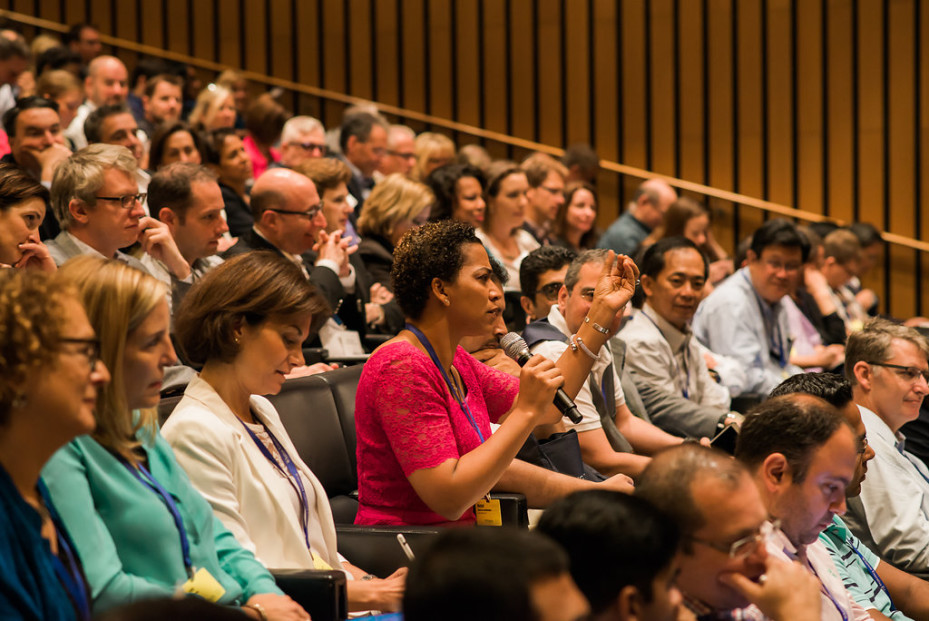
A huge challenge which today’s leaders face is the increasingly rapid pace of technology and the expanding millennial workforce who can more easily adapt to this pace than existing management. If those maintaining leadership roles are going to succeed, shouldn’t they continue to evolve and embrace change, in order to make a difference?
Leadership To Make a Difference was the theme for the 20th annual Wharton Leadership Conference, held June 15, 2016, to a standing room only crowd of 325+. Throughout the day-long conference, eight speakers from a variety of backgrounds and industries shared insights as to how leaders can actively make an impact.
Deborah Brecher, Managing Director of Sponsor Accenture Strategy, set the tone for the conference, stressing that change is indeed necessary for organizations to grow and succeed. The fourth industrial revolution, the Digital Age, is upon us, and as a leader, we must ask ourselves how do we effectively lead our organizations through such massive transformation?
It’s not the “hardware” of the organization which causes failure in change initiatives, but rather the “software”: poor leadership, discontent staff and lack of buy-in with corporate vision. She stated that organizations must instead embrace the “digital disruption” and use it to their advantage by employing new, quantitative approaches to effectively manage change.
Maggie Wilderotter, Chairman/CEO Grand Reserve Inn 
Maggie Wilderotter worked her way up through the ranks of the telecommunications industry, eventually running the worldwide public sector at Microsoft as Senior VP of Strategy, and serving as CEO/Chairman of Frontier Communications until 2016. Ms. Wilderotter believes she made a difference by championing for her employees by being a “CEO of the people.”
Wilderotter became a strong advocate of women and minorities as leaders in the workplace early in her career. She believes women have a natural advantage, and revel in the indirect and can better adapt to change. “Women have a natural advantage in service & customer facing industries,” she said. “Children help shape your leadership skills more than anything,” she added.
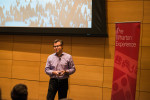 Robert A. Katz, Chairman and CEO, Vail Resorts
Robert A. Katz, Chairman and CEO, Vail Resorts
Someone familiar with big change is Robert A. Katz (W ’75 ). Shortly after 9/11, Katz took the leap from being an investment banker on Wall Street to joining Vail Resorts. Katz, a Wharton undergrad and Wharton Leadership Advisory Board member, was able to align his love of the outdoors and his passion for business by making Vail Resorts one of the Fast Company “50 Most Innovative Companies.” Vail Resorts has also consistently been one of the top-performing stock in the travel industry.
Never one to shy about risks and leaps, Katz created the “Epic Season Pass,” allowing customers unlimited skiing throughout the season at all of the ski resorts within the Vail Resorts network, for about $600. At the time, this was unheard of, as the typical cost for a season pass was $1,800. He wanted the customer to not just visit one of his resorts, but visit as many as possible during the course of the season, and become a lifetime customer who would keep coming back. The risk paid off even though at first many people “thought I was crazy”: the total number of season passes sold have increased from 20,000 to a whopping 600,000 since the Epic Pass inception in 2008.
Katz is a firm believer of emotional intelligence as a major leadership trait and values it being a major contributor in determining his management team’s success. As a leader who wants to make an impact, “you need to ask who you are and what you should be.”
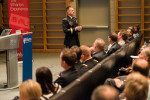 General Daniel B. Allyn, 35th Vice Chief of Staff, U.S. Army
General Daniel B. Allyn, 35th Vice Chief of Staff, U.S. Army
General Allyn focused on qualities of strategic leadership during his presentation. To be an adaptive leader, he said, you must be capable of operating in a decentralized and interconnected environment where “you must lead across multiple domains/lines of effort” and “engage first and often using effective and synchronized communication with team members.” The general added that “our soldiers are never confused when we say one thing and do another. Words whisper, actions thunder.”
He stressed to exemplify balance: our personal actions do really matter, and he believes he makes a difference as a leader by building future leaders of character. These leaders will prepare Joint Forces to prevent conflict, shape security environments, and win wars.
Dinesh C. Paliwal, Chairman, President and CEO, HARMAN
A slightly different format was used when Dinesh C. Paliwal took the floor. Paliwal was interviewed by Peter Cappelli, Director, Wharton Center for Human Resources. Paliwal said it is important to accept cultural differences and immerse yourself in the country’s culture if you want to be an effective leader in a foreign country. Learning the culture and language is vital in order to see all the different angles to achieve the same goals as your foreign counterparts. He said you should also hire a global-oriented team; people who have not just traveled, but who have lived in at least three different countries. These team members will help you align your strategy more effectively and a lot faster with your hosts. “No matter how complex a company or situation, you need clarity & simplification to solve problems,” Paliwal said.
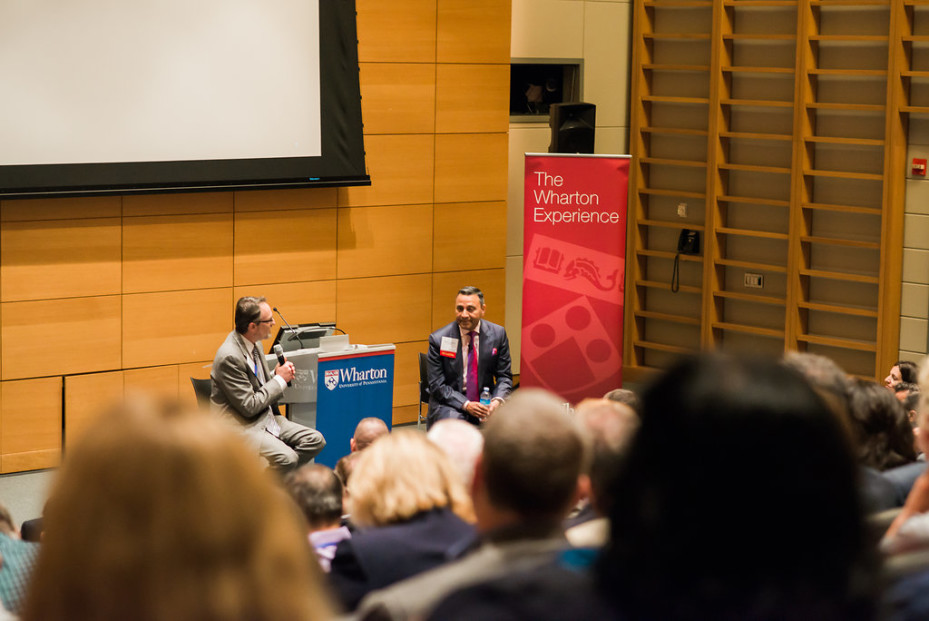
He concluded with saying that the core leadership themes of authenticity, connectivity and creativity have guided him as the HARMAN CEO to lead without borders.
William P. Lauder, Executive Chairman, The Estee Lauder Companies, Inc.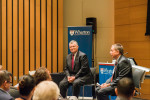
After a highly entertaining magic show by Bill Herz, it was time for William P. Lauder to discuss some of his guidelines for leading in difficult economic times. Lauder helped expand the company’s brand portfolio and international presence as well as establish its e-commerce business when the financial horizon looked bleak. He said you must take advantage of a bad situation during bad economic times and turn it into a positive. An example of this was when a new brand emerged from the traditional Estee Lauder lineup, Origins, which introduced the extremely successful “store within a store” concept. He also made sure the customer experience continued to be at the forefront, knowing that a “hi-touch” company’s customers demand hi-touch service. One of the tougher decisions he faced was to retire one of the older traditional brands, “Prescriptions,” during the crisis. The brand’s sales had dropped dramatically and it was on life-support, so he helped orchestrate a strategy to unwind the brand, always mindful of the customer.
Lauder said that he has always believed education can make a difference and said his company represents a learning and teaching organization. You have to constantly share ideas and build your executive team from within to be the most effective, he said. He is very proud of the fact that the company is truly a people-first organization. “An employee selling our brands may work for Macy’s or Nordstrom’s, but they will tell you that they work for Clinique.” This emotional tie to the brand translates well to the customer experience, which is what it’s all about, Lauder said.
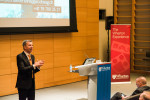 Patrick G. De Maeseneire, CEO, Jacobs Holding AG
Patrick G. De Maeseneire, CEO, Jacobs Holding AG
Next, we heard from Patrick G. De Maeseneire, an accomplished executive in the CG industry, from Belgium. The former CEO of Barry Callebaut, a leading manufacturer of high-quality chocolate and cocoa products, shared his insights on what makes a great CEO. De Maeseneire enlightened us with numerous tips and anecdotes, but here are a few that stood out:
- Only work with what you like.
- Go as broad as possible at first. Don’t go for the money, but opt for a well-organized and structured company.
- Go international as soon as you can.
- Never be the first CEO to work for an entrepreneur.
- You can only move up the ladder if you deliver results. Always under-promise and over-deliver.
- Your salary is paid by the customer, not the shareholders.
- Six to seven years is a good employment cycle. Stop at your highs is you can and don’t hang on to your job. If you’re afraid of losing it, you will.
- Success is built on Three Ts: Team, Trust, and Talent. Accept you own weaknesses, surround yourself with people whose strengths are your weaknesses.
- GOALS: make your goals aggressive. If you can’t measure it, it’s not a goal. Define your Rome. There are many ways to get there. Just lead it.
- DECISIONS: Listen, share, but you decide and follow your instincts. Better to have a decision made than no decision made. If it was wrong, say it, correct it, and move on.
- If you move up the stairs, take your hat off for those coming down. Show respect. “We will all be on the other side one day.”
- There are only two things in life: things you want and things you are afraid of.
Mallika Dutt, Founder, President, and CEO, Breakthrough
Mallika Dutt’s mission in life is to fight for human rights, specifically violence against women. She uses her leadership status as the CEO of Breakthrough (also a 2014 Lipman Family Prize winner) to advocate change and make a difference all over the world. In her presentation she highlighted two of her most successful campaigns:
- Empowering young men across US college campuses to stand up against sexual assault
- Spreading the message against domestic violence in India with the “Ring the Bell” campaign
Dutt said the most important challenges in these types of campaigns are how you change behavior and how you shift attitudes. But we have to act now; we can’t afford to wait.
“We are the ones we are waiting for. We have to strive to make a difference. We can change the world.”
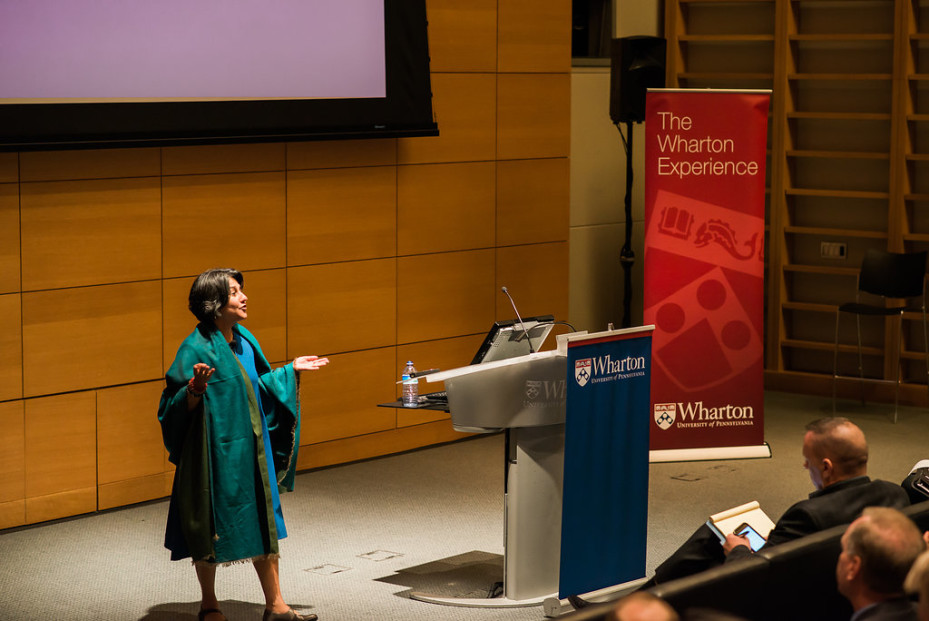
(Overview summary credit: Joshua Jolly; All photo credits: Amber Permsap)
Feedback from the 2016 Leadership Conference
“As a leader and someone who influences leadership, this is an invaluable event!”
–Angela Mauro, Genentech
“The speakers were excellent, and there always seemed to be one nugget you could take away from. Just one nugget can make a difference.“
–Matt Swan, Purdue Pharma


